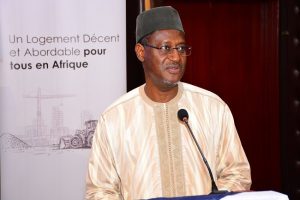Nigeria’s Minister of Housing and Urban Development, Ahmed Musa Dangiwa, who doubles as the Chair of the Executive Board of UN-Habitat and the Chair of the 2023 Annual General Meeting (AGM) Bureau of the Shelter Afrique Development Bank (ShafDB), is advocating for a strategic partnership between Shelter Afrique Development Bank (ShafDB) and UN-Habitat, the United Nations Human Settlements Programme.

The move, Dangiwa said, would be critical in addressing Africa’s pressing housing challenges, asserting that effective long-term housing crisis management on the continent will depend on such collaborations.
Speaking at a dinner hosted in his honour by ShafDB at the bank’s headquarters in Nairobi, Dangiwa said the partnership between ShafDB and UN-Habitat would be complementary for both institutions in delivering their respective goals in Africa.
“As the chair of the Annual General Meeting (AGM) bureau of Shelter Afrique Development Bank and also the chair of the executive board of the United Nations Human Settlement programme, I’m committed to fostering strategic collaboration between these two institutions. This is because I believe that the partnership between ShafDB and UN-Habitat would represent a powerful alliance for addressing the housing deficit and promoting sustainable development across Africa,” Dangiwa stated.
“By leveraging our respective strengths, expertise, resources and abilities to leverage concessional funding from DFI’s, we can through this partnership increase the size of our interventions and amplify impact and accelerate progress towards our shared goals of affordable housing for all,” the minister added.
Lauding the move, Shelter Afrique Development Bank Managing Director, Thierno Habib Hann, said that, by joining forces, the two institutions would be able to leverage their complementary strengths to implement innovative solutions and initiatives tailored to Africa’s diverse housing landscape.
“There are various areas where ShafDB and UN-Habitat can collaborate including financing, research, data exchange, capacity building, policy development, and even community participation. The best part is that both organisations are based right here in Nairobi and understands Africa’s housing challenges pretty well,” Hann remarked.
Growing Deficit
Dangiwa noted that Africa is experiencing fast urbanisation and population growth, which had increased demand for affordable and environmentally friendly housing to critical levels.
“With close to 52 million people lacking adequate housing, Africa is facing a pressing humanitarian concern with profound socioeconomic implications. It is therefore critical that Shelter Afrique acts as catalyst for change to bridge this housing gap and ensure access to affordable housing for all as a matter of urgency,” Dangiwa stated.
He urged ShafDB to put in place initiatives to empower governments, developers and communities across the continent to undertake large scale housing projects to help reduce the housing deficit.
